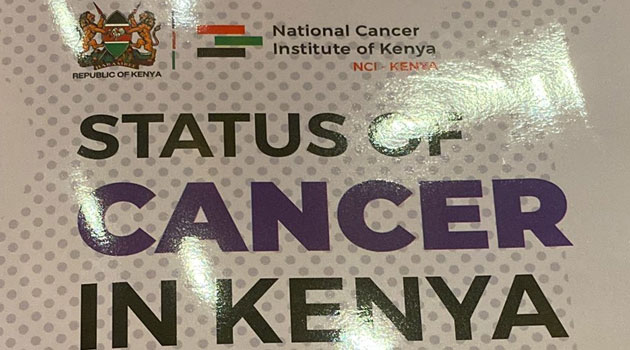A new study has estimated access to comprehensive cancer care at 23 per cent pointing to a grim picture on national efforts to wage an effective war against the disease.
The report released on Thursday during the country’s inaugural National Cancer Summit showed that most Kenyans especially the disadvantaged and the poor cannot access much needed cancer care services.
The report by the National Cancer Institute (NCI) coming just days to the World Cancer Day marked on February 4 noted with concern that cancer care remains a privilege for the few.
The huge disparity was reported even as the effects of cancer remained a national concern with the disease listed as the third leading cause of death in Kenya.
It is also the second leading cause of non-communicable disease deaths in the country with 2 in 3 people with cancer projected die.
“Only about 23 per cent of all cancer patients in Kenya access the cancer management services they need to access screening and early diagnostic services are limited,” the report reads in part.
“Further, the available treatment modalities for cancer carry high costs that are protracted in the lifespan of the affected individual,” it added.
Data reported at the National Cancer Registry for 2020/2021, showed 47,887 new cases and 32,500 cancer deaths occurring every year.
National Cancer Summit
During the National Cancer Summit, NCI Chairperson Dr Gitahi Githinji said unless action is taken, the country’s cancer burden will double.
- High quality advanced screening services may explain high cancer cases in the city, Medic says
- You’ve no business telling us what to do – Gachagua to Uhuru
- Ruto makes new appointments to board, state corporations
“Research shows that if no measures are taken in the next 20 years cancer deaths will double,” Dr Githinji stated.
“This means we will have 150 cancer deaths daily because currently we are at 70,” he cautioned.
Various stakeholders who spoke underscored the importance of raising awareness of cancer and to encourage its prevention, detection, and treatment.
The other aspect highlighted in the summit in cancer management is the financial protection of patients and their families through social health insurance. This, participants noted, is especially useful due to the high cost of diagnosis and treatment.
“Further, the available treatment modalities for cancer carry high costs that are protracted in the lifespan of the affected individual,” he added.
National Social Health Insurance Fund
Health Cabinet Secretary Susan Nakhumicha announced that the government will be rolling out the National Social Health Insurance Fund which will replace the National Hospital Insurance Fund (NHIF).
CS Nakhumicha noted that the Universal Health Coverage has identified cancer as a priority and that they are going to strengthen primary health care for affordable screening and diagnosis.
The role of counties in the fight against cancer is also key in ensuring that cancer care services are available in the counties so that patients wouldn’t have to travel all the way to Nairobi for diagnosis and chemotherapy sessions for cancer patients.
In terms of cancer specialists in the country, the report revealed that Kenya currently has 58 oncologists, 60 oncology nurses and 12 oncology pharmacists.
There are 10 medical physicists, 27 radiotherapy technologists and two nuclear medicine physicians.
Comprehensive Cancer Centre
The findings by the National Cancer Institute shows that there are three national comprehensive cancer centers in the country including Kenyatta National Hospital (KNH), Moi Teaching and Referral Hospital and Kenyatta University Teaching Research and Referral Hospital.
The Kenyatta University Teaching Research and Referral hospital (KUTRRH) has a state of the art Integrated Molecular Imaging Centre providing PET/SPECT CT services and is linked to a hospitality center.
They also recently acquired a cyber-knife for highly specialized cancer treatment.
There are ten regional cancer centers in Mombasa, Garissa, Nakuru, Nyeri, Meru, Embu, Machakos, Kisumu, Kakamega and Longisa.
Three of these, Garissa, Nakuru and Mombasa are able to provide radiotherapy services.
In the private sector, there are six radiotherapy centres including Agha Khan, Nairobi hospital, Texas cancer center, Nairobi West hospital, Cancer care Kenya and Equra Cancer Centre in Eldoret.
There are nineteen external beam radiotherapy machines in the country with eight units in public hospitals.
“This falls short of the recommendation by the International Atomic Energy Agency of at least 1 machine per 1,000,000 population,” reads the report.
The report shows that the most common cancers in the country are breast at 15.9 per cent followed by cervical 13.3 per cent, esophageal 11.8 per cent, prostate 10.1 per cent and colorectal cancer at 7.1 per cent.
On the distribution of cancer cases by county, the top five counties with the highest proportion of cases reported to the registry are Nairobi, Nakuru, Kiambu, Machakos and Nyeri in that order.



